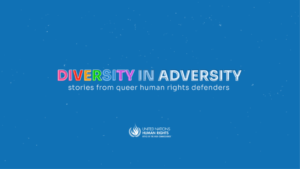Audiencia con Personas Defensoras de los Derechos Humanos en Ecuador
2 de abril de 2024
El mes pasado, marzo de 2024, me reuní con personas defensoras de los derechos humanos en Ecuador, en una audiencia virtual. Fue una oportunidad para escuchar directamente a quienes promueven los derechos humanos en el país, y para presentar las herramientas de mi mandato.
Participaron personas defensoras de comunidades de todo Ecuador, muchos de ellos procedentes de zonas rurales. Casi todas las personas defensoras se habían enfrentado a algún tipo de represalia por su trabajo en defensa de los derechos humanos, ya fuera por parte de agentes estatales, grupos armados no estatales o empresas. Varios de los y las defensores conectaban desde lugares a los que se habían visto obligados a trasladarse tras enfrentarse a amenazas inminentes en sus pueblos de origen.
El panorama pintado por los y las participantes era extremadamente preocupante. Todas las personas defensoras que intervinieron manifestaron su grave preocupación por la situación de quienes defienden los derechos humanos en el país.
Muchas de los y las defensores se habían encontrado en peligro tras haber denunciado a violaciones de derechos humanos relacionadas con las industrias extractivas en el país, en particular los impactos de la minería, pero también de las plantaciones de aceite de palma y otros monocultivos.
Ecuador ha ratificado el Convenio 169 de la OIT, que establece que los pueblos indígenas y tribales tienen derecho a decidir sus propias prioridades en materia de desarrollo y a dar o negar su consentimiento libre, previo e informado para las actividades que afecten a sus territorios. Sin embargo, en muchos casos el Estado solo parece garantizar estos derechos de manera superficial, así como los derechos consagrados para todos y todas en los Pactos Internacionales de Derechos Civiles y Políticos y de Derechos Económicos, Sociales y Culturales. Esto crea oportunidades para empresas inescrupulosas, incluidas las transnacionales con sede en países occidentales ricos.
Las personas defensoras de los derechos humanos se enfrentan a amenazas, incluidas amenazas de muerte, agresiones físicas y acoso en línea. Algunos han sido secuestradas y otras asesinadas. Dos personas defensoras me contaron cómo sus casas habían sido destruidas recientemente, una de ellas asaltada e incendiada.
Las demandas espurias contra personas defensoras que protestan pacíficamente contra la minería parecen habituales y generalizadas. Los y las defensores se sienten abandonados por las autoridades, que permiten que los ataques en su contra queden impunes. Las personas defensoras que protegen el medio ambiente, el derecho al agua y el acceso a la tierra de las comunidades que dependen de ella para el cumplimiento de sus derechos están en una situación particularmente difícil. Como en muchos países, las defensoras están en primera línea, y los riesgos son especialmente altos para las mujeres indígenas, queer y afrodescendientes, que suelen trabajar en zonas rurales.
En las audiencias, también participaron personas defensores de los derechos de la comunidad LGBT y de las personas con discapacidad.
Una defensora trans me habló de cómo su colega había sido asesinada impunemente, y una defensora con discapacidad me habló de su trabajo para crear un espacio seguro para promover los derechos de las personas con discapacidad, sólo para ser blanco de bandas criminales.
Una defensora que trabaja para proteger los derechos sexuales y reproductivos habló de la criminalización de su organización. Las defensoras que trabajan en este ámbito son blanco de grupos antiderechos, incluso mediante doxxing. Todo esto es sumamente preocupante.
Continuaré siguiendo de cerca de la situación de las personas defensores en el país y plantearé los casos de los que tenga conocimiento a las autoridades ecuatorianas, a las que insto a que aborden con urgencia la inseguridad a la que se enfrentan las personas defensores en el país.
Hearing with Human Rights Defenders in Ecuador
2 April 2024
Last month, I held two online hearings with human rights defenders in Ecuador. It was an opportunity for me to learn more about the environment for promoting human rights in the country, by hearing directly from defenders themselves, and for me to present the tools of my mandate.
Defenders participated from communities across Ecuador, with many connecting from rural areas. Almost all of the defenders had faced some form of retaliation for their human rights work, whether by State actors, non-State armed groups or companies. Several of the defenders were speaking from places they had been forced to locate to after facing imminent threats in their home towns.
Overall, the picture painted by the defenders was extremely worrying, with all of those who spoke voicing serious concerns about the situation for those defending human rights in the country.
Many of the defenders had found themselves at risk after having spoken out and helped to organise communities faced with human rights violations linked to extractive industries in the country, in particular mining, but also palm oil plantations and other monocultures.
Ecuador is a party to ILO Convention 169, which states that indigenous and trial peoples have the right to decide their own priorities when it comes to development, and to give or withhold their free, prior and informed consent for activities affecting their territories. Yet, in many cases, the State seems to be only paying lip service to these rights, as well as those enshrined for all in the International Covenants on Civil and Political and Economic, Social and Cultural Rights. This creates opportunities for unscrupulous companies, including transnationals headquartered in wealthy western nations.
HRDs are facing threats, including death threats, physical attacks and harassment online. Some have been kidnapped and others killed. Two defenders I spoke with told me how their homes had recently been destroyed, with one broken into and burnt down.
Spurious lawsuits against people peacefully protesting against mining appear commonplace and widespread. Defenders feel they have been abandoned by the authorities, who allow attacks against HRDs to rest in impunity. Those seeking to protect the environment, defend the right to water, and protect access to land for communities who rely on it for the fulfillment of their rights are being targeted. As in many cases, WHRDs are on the front line, with the risks particularly high for indigenous, queer and afro-descendant women, who are often working in rural areas.
Defenders of the rights of the LGBT community and people with disabilities also participated in the hearings. A trans WHRD told me of how her colleague had been killed with impunity, and a WHRD with a disability told me about her work to create a safe space to promote the rights of the people with disabilities, only to be targeted by criminal gangs. A WHRD working to protect sexual and reproductive rights spoke of the criminalisation of her organisation. WHRDs working this area are being targeted by anti-rights groups, including through doxxing. All this is of utmost concern.
I will continue to follow the situation of defenders in the country and intend to raise the cases brought to my attention with the Ecuadorian authorities, who I urge to address the insecurity faced by defenders in the country as a matter of urgency.



